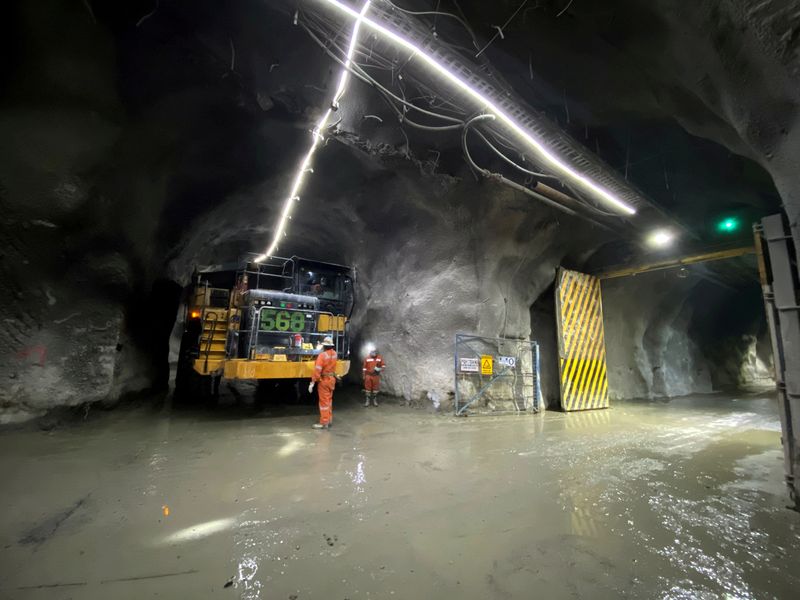By Fabian Cambero
SANTIAGO (Reuters) - Now that Chile has passed an increase in mining royalties, copper miners are pushing for incentives to keep investing in production of the metal needed for the renewable energy revolution, with steps such as cuts in energy costs, speeded-up permit approvals and other incentives.
Beginning in 2024, mining royalties will rise to a range of 8% to 26% of operating margin from the current range of 5% to 14%. There will also be a 1% ad valorem tax based on sales for miners that post a profit.
Chile's Mining Council, which comprises large private firms, estimates this will ultimately boost the average tax rate of 44.7%, exceeding the top of the range of 38-to-44% in competing countries such as Peru and Australia.
"We're hoping that this competitive disadvantage is somehow compensated with other public policy actions that encourage investment," said the association's head of studies, Jose Tomas Morel.
The elevated royalty is the latest flashpoint between the mining industry in the world's No. 1 copper and No. 2 lithium producer and the leftist government of Gabriel Boric, who came to office promising to get the country's mining industry to help pay for expanded social programs. Industry lobbying did prompt a cut in the original royalty rise plan, and some miners have said they will continue to invest.
"Despite being a strong left-wing government, they engaged the industry and sought to understand and work towards an outcome that struck a balance between public needs and what was required to maintain the competitivity of the industry and the country," said Mark Henry, CEO of BHP Group (NYSE:BHP), Chile's No. 2 player which had initially said the royalty would prompt a review of its $10 billion investment plan in Chile.
"BHP will continue to invest."
Other big miners were more tentative, and some mining executives are skeptical the industry will follow through on an estimated $70 billion in planned investment without additional stimulus. With Chile's aging mines producing less copper, analysts noted that the more mining investment was needed to produce the government's desired revenue increase, even with the higher royalty.
Industry experts are closely watching whether Chilean miner Antofagasta (LON:ANTO)'s decides to invest $3.7 billion to expand its Centinela mine towards year end.
Antofagasta did not respond to a request for comment. In June, CEO Ivan Arriagada told local media the company was reevaluating the project because the new royalty "does impact competitiveness."
"Some projects on the margin will have to be reassessed to determine whether they are viable or not," Arriagada said.
Freeport-McMoRan (NYSE:FCX), one of the world's largest copper producers, has said it will put Chile investment decisions on hold due to political uncertainty.
Boric has pledged investment incentives. The government is in talks with mining companies and other interested parties. Miners have yet to provide a detailed list of incentives they are seeking.
Morel said the government should speed up and simplify the permitting process in which projects need hundreds of permits with each taking months to approve. He said the government should also help miners navigate thorny environmental and indigenous regulation issues which can lead to lengthy court cases.
Energy costs are another concern. Chile's mining industry consumes about 15% of the country's total energy output, and the Chilean Copper Commission says energy represents about 11% of miners' costs. The industry would like the government to pass regulations cutting energy costs for miners.
DECLINING PRODUCTION
The mining royalty increase was part of a wider tax reform plan that congress rejected in March. Boric's government hopes to boost total copper revenue for the state up to 0.45% of GDP or about $1.35 billion a year, using the funds to boost programs such as child care, security, health care and education.
Gustavo Lagos, a professor at the mining department at Catholic University in Santiago, said the new royalty might not hit its target since most new projects are focused on compensating for declining production rather than adding supply.
"I think there will be investment, what I don't think is that production will grow more, it will be difficult for us to go above 6 million (metric) tons in Chile and that is what ultimately determines revenue," Lagos said.
Chile's copper supply has fallen due to the natural decline in mineral grades of its oldest deposits, delays in project start-ups, accidents and other problems. Production in 2022 totaled 5.33 million metric tons, down from a record 5.83 million in 2018.
The government is holding talks with business groups and other political actors for a second shot at tax reform, and miners hope this might possibly boost their chances for incentives.

One mining executive, who asked not to be named due to the sensitivity of the issue, said the government might compromise further to try and boost future investment.
"The (projects) that are not carried out are going to come to a point where they are going to negotiate with the government and say 'I'm doing this project but I need another guarantee,'" the executive said.